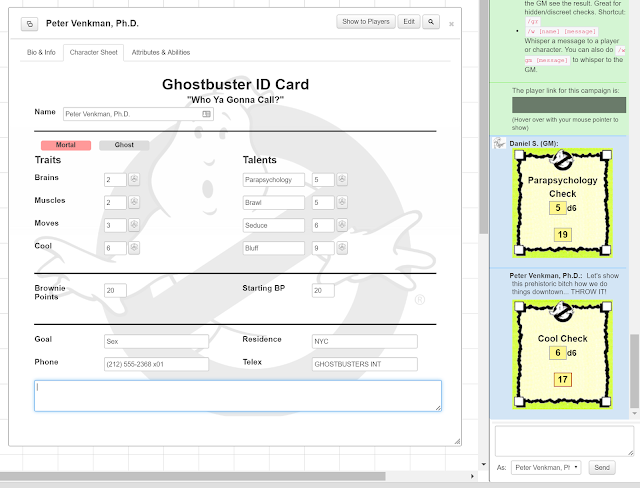From a Camera on the Map to the Virtual Tabletop
I submitted my first GitHub pull request for Roll20 this evening - an update to the Ghostbusters character sheet to support ghost characters (making this Ghostmaster's life easier). As I did so I reflected on how much remote tabletop RPGs have changed over the years.
The first time I ever had to do remote gaming was after a player moved away but wanted to stay in the group. We wound up using a webcam that either pointed at us or at the physical tabletop and generally trusted him on his rolling. We tried a variety of early virtual tabletop tools but we found they suffered from problems like doing too little (why not just use Skype?), were too complicated (performing surgery on my router settings is not a fun activity), and too specialized for a given game or set of games.
As my gaming group grew more dispersed the ability to use a virtual tabletop became more important. We had a lot of early success with Fantasy Grounds and I'd certainly have no objection to using it again for a supported game. In the games they have an official license for the virtual tabletop tends to be superb - you typically get all the rules built in to the program. Spells, weapons, initiative trackers, etc. were all baked right in. The frustration I had with Fantasy Grounds was that it was very hard to customize - the tools you could purchase for it were first rate, but when it came to going on your own I found modifications to existing games and creating entirely new games to be very difficult. This may have changed since last I used it.
What I've used most over the past several years is Roll20. Like Fantasy Grounds, Roll20 has both community and officially licensed rule sets. These tend to be centered around the character sheet for the game. For me, I've had better luck using Roll20 - there are a lot of community supported rule sets and I've also found it easier to customize rule sets for my own games. Moreover, I'm getting more proficient at modifying character sheets in HTML and CSS, a domain where my background in software development has been quite useful.
I suspect the community development model will remain quite popular. I also think it behooves RPG publishers to assist in the creation of extensions for popular virtual tabletop programs to support their games.






Comments
Post a Comment